八年级英语下册 Unit 1 What’s the matter Section B课时作业 (新版)人教新目标版
八年级英语下册Unit1What'sthematterSectionB课件(新版)人教新目标版

3. _____________ 登山者;攀登者 4. ____c_l_im__b_e_r___ (交通)事故;意外遭遇
5. ____a_c_c_i_d_e_n_t__ 千克;公斤
6. ______k_il_o_____ 岩石 7. ______r_o_c_k____ 刀 8. _____k_n_if_e_____ 血
第九页,共36页。
I'm never interested in watching crosstalk. 我从来不曾对观 看相声表演感兴趣。 【熟记(shú jì)】take/have an interest in (doing)…=be/get/ become interested in (doing)… 对(做)……感兴趣 places of interest 名胜
英语(yīnɡ yǔ) 八年级 下册 配人教(新目 标)版
Unit 1 What's the matter?
Section B
第一页,共36页。
课前预习
一、重点单词 1. _____k_n_e_e_____ 膝;膝盖 2. _____________ (we的反身代词(fǎn shēn dài cí))我们自己
继续或坚持做某事
23. havkeeeap_______o_n__ ___________遭遇(zāoyù)严重意外
24. go ______s_e_r_io_u_s_____a__c_c_id_e去n爬t 山
25. _____m_o_u_n_t_a_in_____放cl弃imbing
give
up
第六页,共36页。
usually offered tea by the host. (2016长沙)
八年级英语下册 Unit 1 What’s the matter Section B(2a-2d)
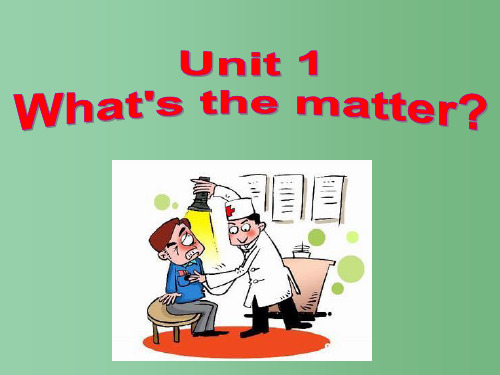
Do we have the same spirit as Aron? Let's think about it before we find ourselves" between a rock and a hard place", and before we have to make a decision that could mean life or death.
1. 观察下列句子。
1) He found himself in a very dangerous situation.
2) He was climbing by himself. 3) He bandaged himself so that he would not
lose too much blood. 4) … we find ourselves “between a rock and
2c
Read the statements and circle True, False or Don’t Know.
1 Aron almost lost his life mtharneeytimes because of climbing accidents.
True False Don’t know
4. What did Aron do after the accident?
He wrote a book called Between a Rock and a Hard Place.
5. What does “between a rock and a hard place” mean?
It means being in a difficult situation that you cannot seem to get out of.
2014八年级下Unit1_What's_the_matter Section A

2a-2b
Listen and number the pictures 1-5 in the order you hear them. Listen again and match the problems with the advice.
注:with为介词,后跟人称代词宾格, 如her,him,them等。
怎 么 了
eg:What’s the matter with your mother? What’s wrong with you? What’s the trouble with her?
ache 、sore和hurt 的区别: 1. ache 是一个名词后缀,如: toothache 2 . sore形容词,修饰名词,指的是 身体某一部位的酸痛。如:sore back, sore throat sore leg ,sore eyes 3. hurt动词,指“刺痛,使受伤 痛”。如:He hurts his leg.他伤了腿。 还可以说“His leg hurts.”他腿疼。
--I think he shouldn’t …
shouldn’t = should not He has a sore throat
drink cold drink.
He shouldn’t eat ice cream.
eat hot food.
talk too much.
talk loudly.
problem question
n. 问题,难题,习题(有待解决) n. 问题(有待回答)
They are doing some math problems/exercises. May I ask you a question ?
新目标英语八年级下unit1_What's_the_matter__Section_A_3a-3c

(2) in time及时. Tom 及时赶到电影院,看到了爸爸去哪儿。 Tom got to the cinema in time and saw where are we going ,Dad? 区别: on time 按时 我们应该按时完成作业。 We should finish homework on time.
3b
Read the passage again and check the things that happened in the story.
1. _______ Wang Ping was the driver of bus No.26 at 9:00 a.m. yesterday. 2. _______ Bus No. 26 hit an old man on Xhonghua Road. (过去式hit,现在分词:hitting) 3. _______ The old man had a heart problem and needed to go to the hospital right away. 4. _______ The passagers on the bus did not want to go to the hospital, so only Wang Ping went with the woman and old man. 5. _______ Some passagers helped to get the old man onto the bus. 6. _______ The old man got to the hospital in time.
Unit1 What’s the matter?
Period Three (Section A 3a-3c)
八级英语下册UnitWhat'sthematter全单元教案新版人教新目标版

Unit 1 What's the matter年级八学科英语课型新授课时间主备人八年级英语组教学课题Unit 1 What’s the matter?Section A (1a~2d)课时 1教学目标1. 学习用英语表达身体各部位的名称及如何谈论身体健康状况。
2. 培养学生能运用所学语言简单地描述自己的健康状况及如何询问对方的身体健康状况。
3. 通过学习课文内容,养成健康的生活方式。
4. 教育学生学会关心他人,通过询问他人的健康情况并能给予帮助,增进人与人之间的感情。
重点难点教学重点:1.掌握情态动词should / shouldn’t.的用法.2.学习have的用法.教学难点:学会提供帮助的基本句型教学准备PPT教学过程1、新课导入:Step1: Can you name the parts of the body?让学生用英语所处器官名称。
Step2:Follow me:(让学生站起来完成韵律操)Everybody moves your bodyNod your head and touch your faceTouch your nose and close your eyesTouch your ears and clap your handsRaise your arms and look at your backTouch your stomach and tap your footSit down and move your legs2、设问导读:二次备课4. 如果你的头和脖子明天仍然疼的话,请去看医生。
五.拓展探究Homework: Make up a conversation between a doctor and a patient.课堂小结本课通过身体器官韵律操导入课时内容,激发学生的学习兴趣,提高课堂教学的效率,同时针对学生日常生活中的常见症状,让学生在列举过程中掌握患病方式的三种表达方式。
人教版八年级英语下册Unit 1 What’s the matterSection B (1a-1d
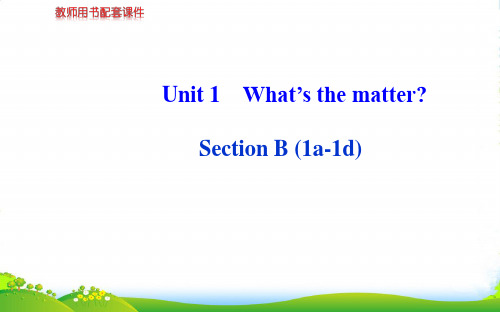
1. If you have a
, you should put your head back.
2. Bob hurt
in P. E. class and he couldn’t move.
3. She
her finger while getting ready for the supper
yesterday.
What happened? 发生了什么事? 【自主领悟】 happen意为“发生”, 为不及物动词, 常表示某事发生的偶然 性。例如: On their way to work, they saw an accident happen on the street. 在上班的路上, 他们看到街上发生了一起事故。
【活学活用】
①—What happened
Mr. Smith yesterday?
—He fell down and hurt his leg.
A. to
B. on
②Great changes have
C. with
D. for
in my hometown these years.
A. happen
(3)“sb. +happen+ _t_o_d_o_sth. ”意为“某人碰巧做某事”。 例如: I happened to meet an old friend of mine in the street yesterday. 昨天我在街上碰巧遇到了一位老朋友。
【误区警示】 (1)happen为不及物动词, 不能用于被动语态。 (2)happen为短暂性动词, 不能与表示一段时间的状语连用。 (3)happen一般用来强调某事发生的偶然性。如要表示事先 安排或有准备的事情或活动, 则不能用happen, 而要用 _ta_k_e__p_la_c_e_。
人教版八年级英语下册unit 1 what's the matter ?Section A2优件
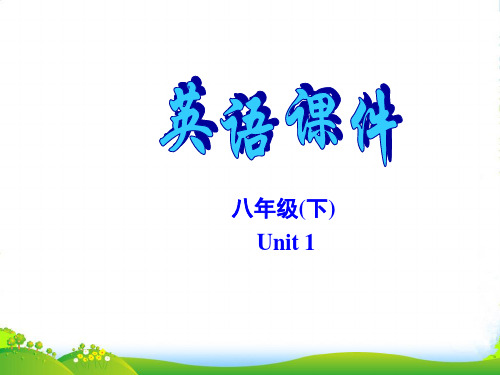
A: What’s the matter? Do you have a sore throat?
B: No, I don’t. A: Do you have a headache? B: Yes, I do. A: You should lie down and rest.
Name Liu Peng
A:What’s the matter?
B: I’m not feeling well.I have a _s_o_re__t_h_ro_a_t_. A: When did it start? B: About _a__w_e_e_k__ago. A: Oh, that’s too bad.You should
Advice: What should they do? A:What’s the matter with you? B:I have a stomachache. A:You should l_i_e_d_o_w__n_a_n_d__r_e_st_. B: That’s a good idea.
_se_e__a_d_e_n_t_i_st____. B: Yes, I think so. A: I hope you feel better soon.
Game time One student mimes an illness. The other students guess the illness and give advice.
2. I have a sore throat. 我喉咙痛。
(1)have vt. 患(得)病, (不用于 进行时态)
He had a bad cold last week. 他上周患了重感冒。
She often has a stomachache.
人教版英语八年级下册Unit1What’s the matterSection A 1a-1c课件

手臂
背部
耳朵
_i_ eye _b_ foot _a_ hand
眼睛
_j_ head
脚(复数feet) 手
_l_ leg _c_ mouth
头
腿
嘴
_d_ neck m__nose _k_ stomach
脖颈 鼻子 胃;腹部
_f_ tooth
牙齿(复数:teeth)
What’s the matter with him/her?
Homework
1. 听力材料抄一遍 2. U1单词matter-hurt,三英一汉抄一遍。
for the first time. 8. If you agree, you can nod(点头) your _h_e_a_d_.
Learning Goals: 1、听录音, 完成相应练习; 2、翻译听力材料,熟读并role-play; 3、能用英语谈谈自己哪里不舒服:
—What’s the matter? —I have a cold.
have a cold 得了流感
have a sore back 背疼
What’s the matter with him/her?
get a stomachache 胃痛
have a toothache 牙疼
What’s the matter with him/her?
have a fever 发烧
New words
matter sore stomachache foot neck
n. 问题;事情 adj. 疼痛的;酸痛的 n.胃痛;腹痛 n. 脚;足 n. 颈;脖子
stomach throat fever lie rest cough
Unit1what’sthematter_SectionA知识点梳理人教版八年级英语下册

人教版八年级下册英语课本知识点梳理Unit 1 wh at’s the matter? sectionA课文内容:What's the matter? 怎么了? (教材第1页)【用法详解】What's the matter? 怎么了?/出什么事了?常用于询问某人患了何种疾病,遇到了什么困难等,也可用于询问某物出了什么故障,其后可接with sb./sth.,表示“某人/某物怎么了?”。
其中matter 用作名词,意为“问题;事情”matter前须加定冠词the。
【例句】What's the matter? 怎么了?Bad luck.I lost my pen. 真倒霉,我弄丢了钢笔.What's the matter with him? 他怎么了?He has a sore back.他背痛【拓展】matter[动词] 要紧;有关系多用在否定句、疑问句或条件句中It doesn't matter.没关系。
(通常用来回答对方的道歉)I have a cold. 我感冒了。
(教材第1页)【用法详解】have a cold (患)感冒。
其中have 用作及物动词,意为“患(病);遭受(病痛)”,常用于结构“have a/an +疾病名称”表示患病或身体某部位不舒服。
此时它不能用于进行时态,其第三人称单数形式为has,过去式为had。
常见的表示病痛的短语还有:have a fever 发烧have a toothache 牙疼have a headache头痛have a cough 咳嗽have a stomachache胃痛Do you often have a cold? 你经常感冒吗?Jim had a stomachache after supper yesterday.吉姆昨天晚饭后胃痛。
l have a stomachache.我胃痛。
( 教材第1 页)【用法详解】stomachache [名词]胃痛;腹痛是由“名词stomach(;腹部)+ache(疼痛)”构成的复合名词。
Unit 1 What's the matter_ Section A 知识点过关

人教版英语八年级下册第一单元Section A重点句子过关Unit1 What’s the matter?1. What’ s the matter? 怎么啦?出什么事情了?matter问题、事情,名词,在此句型中可以改为problem\trouble,What’s the problem\trouble ?注意:当要询问某人怎么了,加上“with sb”,即:What’ s the matter with you? = What’s the trouble with you? = What’ s wrong with you? 你怎么了?温馨提示:matter 和trouble 为名词,其前可加the 或形容词性物主代词,wrong 是形容词,不能加the拓展:matter的用法It doesn’t matter 没关系(用来回答别人道歉时的用语)例题:—I’m very sorry. I ’m late for class.—__________.A. It doesn’t matterB. You’d better notC. Take it easyD. It’s too bad2. I have a cold 我感冒了I have a stomachache 我患胃痛I have a sore back. 我背痛。
关于have 表示“得病”、“患病”have a/an + 疾病名词“患...病”例如:have a sore throat 患喉咙痛have a fever 发烧have a cold =catch a cold 患感冒have a stomachache 患胃痛have a toothache患牙痛have a headache 患头痛have a nosebleed 流鼻血例题:I didn’t eat anything last night, because I _____ a stomachache.A.wasB. wentC. hadD. took参考答案:C,have表示患病,因时间提示是昨天晚上,用动词过去式had注意:have表示“患病”时,在具体运用中要注意“主谓一致”和时态3. She talked too much yesterday and didn’t drink enough water.她昨天说话太多了并且没有喝足够的水。
What's+the+matter?+Section+B+(1a-3b) 人教版英语八年级下册
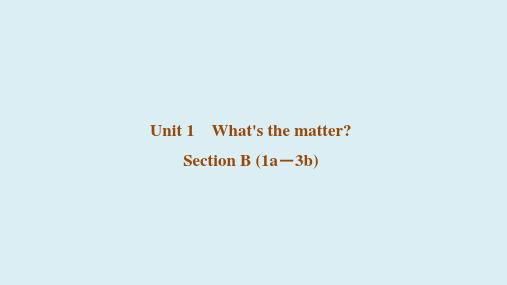
• (v.)攀登;爬 __cl_im__b__
重点 单词
名词
4.(交通)事故;意外遭遇 __a_c_c_id_e_n_t__
5. 情况;状况 __si_t_u_a_ti_o_n___
6. 千克;公斤 __k_i_lo__
7. 岩石 _r_o_c_k__
8. 刀 __k_n_if_e__
• (pl.) __k_n_i_v_es__
Unit 1 What's the matter? Section B (1a-3b)
单词和短语
课前预习
请预习下列重点单词和短语,并完成下面的表格及相关训练(标•的
为重点单词拓展内容,加底纹的为2022年课标新增词汇)。
重点 单词
名词
1. 膝;膝盖 _k_n__ee__ 2. 鼻出血 _n_o_s_e_b_l_e_ed___ 3. 登山者;攀登者 __c_li_m_b__er__
7. 放弃 __g_iv_e__u_p__
学以致用 根据语境或提示,完成填空。 1.The little boy cut his finger and lost much b_lo_o_d__ yesterday. 2. The mother cared for the __s_ic_k__(生病的)child day and night. 3.The __d_e_a_th__(die) of his father made him really sad for a long time. 4. Think twice before you make a __d_e_c_i_si_o_n__(decide) on this matter. 5. The car was out of c_o_n_t_r_o_l _ and hit a tree. Luckily, the driver didn't get hurt.
Unit 1 What's the matter section A 人教版八年级下册英语基础训练
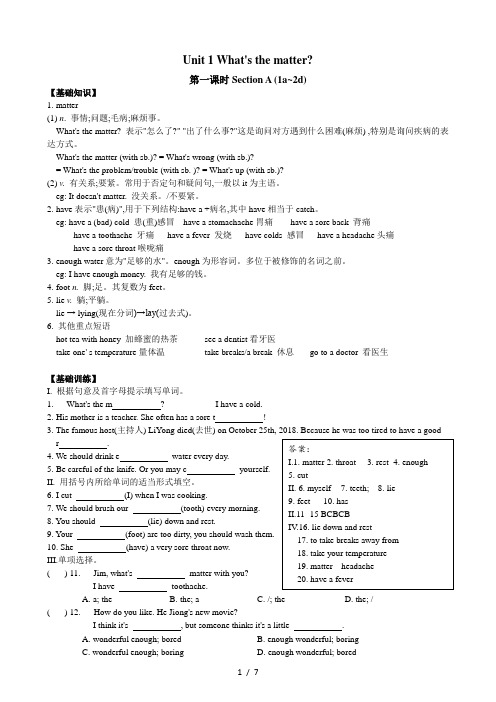
Unit 1 What's the matter?第一课时Section A (1a~2d)【基础知识】1. matter(1) n. 事情;问题;毛病;麻烦事。
What's the matter? 表示"怎么了?" "出了什么事?"这是询问对方遇到什么困难(麻烦) ,特别是询问疾病的表达方式。
What's the matter (with sb.)? = What's wrong (with sb.)?= What's the problem/trouble (with sb. )? = What's up (with sb.)?(2) v.有关系;要紧。
常用于否定句和疑问句,一般以it为主语。
eg: It doesn't matter. 没关系。
/不要紧。
2. have表示"患(病)",用于下列结构:have a +病名,其中have相当于catch。
eg: have a (bad) cold 患(重)感冒have a stomachache胃痛have a sore back 背痛have a toothache 牙痛have a fever 发烧have colds 感冒have a headache头痛have a sore throat喉咙痛3. enough water意为"足够的水"。
enough为形容词。
多位于被修饰的名词之前。
eg: I have enough money. 我有足够的钱。
4. foot n.脚;足。
其复数为feet。
5. lie v.躺;平躺。
lie → lying(现在分词)→lay(过去式)。
6. 其他重点短语hot tea with honey 加蜂蜜的热茶see a dentist看牙医take one' s temperature量体温take breaks/a break 休息go to a doctor 看医生【基础训练】I. 根据句意及首字母提示填写单词。
八年级英语下册习题与单元测试:Unit 1 What’s the matter

Unit 1 What’s the matter Section A(20分钟50分)Ⅰ. 根据句意及首字母或汉语提示完成单词(10分)1. I think you have a f . Let me take your temperature.2. I usually walk to school on f , but sometimes I ride my bike.3. My father is very tired now, and he wants to r for an hour.4. If you get into (苦恼), we’ll help you out. Don’t worry.5. To my (惊奇), the traffic is so heavy at this time in the street. Ⅱ. 用所给词的适当形式填空(10分)1. You’d better brush your(tooth)twice a day.2. There are so many (passeng er)on the bus, so it’s really crowded.3. Bad luck! Little Jenny cut (she)with a knife yesterday.4. When she saw an old woman (lie)on the side of the road, she called 120 at once.5. At that time the young man only thought about (save)a life.Ⅲ. 单项选择(10分)1. —What’s matter with you?—I have bad cold.A. a; theB. the; aC. the; /D. the; the2. —What does your new English teacher look like?—She is a pretty lady long hair.A. atB. inC. withD. to3. —I have a .—Maybe you should see a dentist.A. coldB. stomachacheC. headacheD. toothache4. The man hurt working in the field. He has a sore back.A. herselfB. himselfC. yourselfD. themselves5. It’s said that a young girl took the old lady to the hospital.A. 20 years oldB. 20 year oldC. 20-years-oldD. 20-year-oldⅣ. 补全对话(10分)从方框中选择最佳选项完成对话, 有两项多余。
人教版八年级英语下册Unit1What's the matter Section A 3a-3c课件

The man wRasessualvted by the doctors in time.
Read the passage again and check the things that
3. He only thought about saving a life. 他只是想着挽救生命。 【观察】你能看出without thinking和about saving a life 的共 同点吗? 共同点:介词 + doing 通常情况下,介词 + 名词/宾格代词/动词-ing e.g. give a book to me look after my mother
Discuss the questions with a partner.
1. Why was Wang Ping surprised that the passengers agreed to go to the hospital with him?
2. Did the passengers think Wang Ping did the right thing? How do you know?
The driver, the old man and a woman.
Read para. 2 and put the sentences in correct order. 1. Some passengers helped the driver to move the man onto
the bus. 2. The driver stopped the bus without thinking twice. 3. He expected some passengers to get off and wait for the
Unit1 What’s the matter Section A 知识点讲解

Unit1 What’s the matter?知识点讲解与练习Section A怎么啦?出什么事情了?What’ s the matter with you?= What’s the trouble with you?= What’ s wrong with you?你怎么了?【注】:matter 和trouble 为名词,其前可加the 或形容词性物主代词,wrong 是adj. 不能加the( ) 1.【2013自贡】—What’s the matter ______ Tom. He is wet through.—His car ran _______ the river.A. with; inB. to; intoC. with; into【用法】用于询问某人有什么病或某人遇到什么麻烦、问题其后跟询问对象时, 与介词with连用。
即:在哪吗?)A. troubleB. the matterC. thewrong D. matter( ) 3. —______?—Nothing serious , but a bit tired.—Better have a rest now, dear. (你知道其他问句的答案吗?)A. Is that allB. Is there anything elseC. What’s thisD. What’s the matter with you( ) 4.【2013湖北孝感】—_________?(你知道其他问句的答案吗?)—I have a headache and I don’t feel like eating anything.A. How are youB. What can I do for youC. What’s the matter with youD. How do you like it( )5.【2011.云南昆明】—What’s the matter with Tina?—_________.A. She is away.B. She is cool.C. She has a sore throat.D. She should take some medicine1. ---Tell me ____________. ---Well, it’s like (201)3年中考A. what is wrong with itB. what isitC. what the matter is with itD. what is it like—_______A. That’s rightB.It doesn’t matterC. Thank you( )3. 【2013江苏徐州】Please don't throw paper on the ground.—__,I won't. (你知道其他选项的意思吗?)A. Excuse meB. That's all rightC. SorryD. It doesn't matter( )4.【2013黑龙江齐齐哈尔】-I have a pain in my back.-_____ . You’d better see a doctor.A. I’m sorry to hear thatB. Nothing seriousC. It doesn’t matter( )5.【2013湖北武汉】—I’m very sorry. I broke your tea cup.—__________. (你知道其他选项的意思吗?)A. It doesn’t matterB. You’d better notC. Take it easyD. It’s too bad( )6.【2013四川广安】—Sorry, I'm late again.—______.A.That’s OK B.It doesn't matter C.Good idea是cold 寒冷的it’s cold.cold 不可数名词 in the cold 在寒冷的地方Her hands were blue with cold. 她的双手冻得发青。
人教版八年级英语下册Unit 1 What’s the matterSection B(2a—2e)
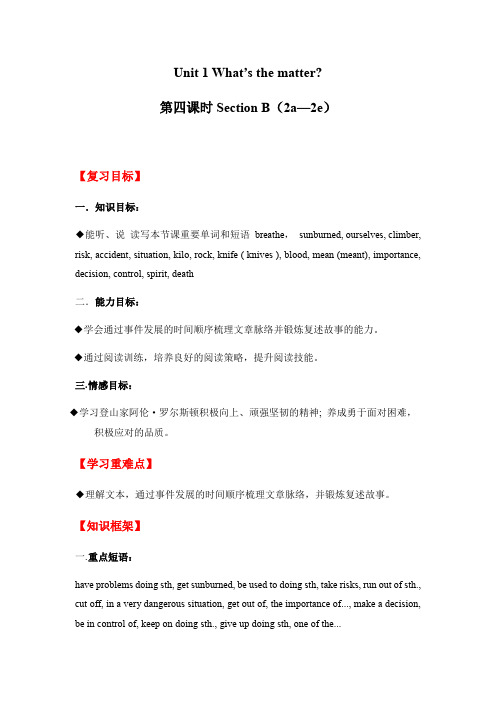
Unit 1 What’s the matter?第四课时Section B(2a—2e)【复习目标】一.知识目标:◆能听、说读写本节课重要单词和短语breathe,sunburned, ourselves, climber, risk, accident, situation, kilo, rock, knife ( knives ), blood, mean (meant), importance, decision, control, spirit, death二.能力目标:◆学会通过事件发展的时间顺序梳理文章脉络并锻炼复述故事的能力。
◆通过阅读训练,培养良好的阅读策略,提升阅读技能。
三.情感目标:◆学习登山家阿伦·罗尔斯顿积极向上、顽强坚韧的精神; 养成勇于面对困难,积极应对的品质。
【学习重难点】◆理解文本,通过事件发展的时间顺序梳理文章脉络,并锻炼复述故事。
【知识框架】一.重点短语:have problems doing sth, get sunburned, be used to doing sth, take risks, run out of sth., cut off, in a very dangerous situation, get out of, the importance of..., make a decision, be in control of, keep on doing sth., give up doing sth, one of the...二.重难点句子:1.As a moutain climber, Aron is used to taking risks.作为一名登山者,阿伦已习惯了冒险.2. But when his water ran out, he knew that he would have to do something to save his own life.但是当他的水喝光之后,他知道他必须要做点什么来挽救自己的生命.3. His love for mountain climing is so great that he kept on climbing moutains even after this experience.他对登山如此痴迷,以至于在这次断臂之后他依然继续从事登山运动.4. Let’s think about it before we find ourselves “between a rock and a hard place”, and before we have to make a decision that could mean life or death.在我们发现自己处于困境之前或在我们不得不作出生死抉择之前,让我们先思考一下吧。
- 1、下载文档前请自行甄别文档内容的完整性,平台不提供额外的编辑、内容补充、找答案等附加服务。
- 2、"仅部分预览"的文档,不可在线预览部分如存在完整性等问题,可反馈申请退款(可完整预览的文档不适用该条件!)。
- 3、如文档侵犯您的权益,请联系客服反馈,我们会尽快为您处理(人工客服工作时间:9:00-18:30)。
Unit 1 What’s the matter Section B
(20分钟50分)
Ⅰ. 根据句意及首字母或汉语提示完成单词(10分)
1. The word “passenger” m a person who is travelling in a vehicle such as a bus, a boat or a plane.
2. Linda Green works in a hospital. She is a n .
3. Parents should allow their children to make their own (决定).
4. I hope you can be in (限制; 管理)of your own future.
5. We must have the (勇气, 意志)to face difficulties.
Ⅱ. 单项选择(10分)
1. —Mum, I’m not feeling well.
—Oh, dear!
A. Really?
B. Not at all.
C. W hat’s the matter?
D. All right.
2. Jim Smith has food, and his children are suffering from hunger now.
A. run out
B. run out of
C. cut off
D. get out of
3. After a short rest, the young climber kept on the mountain.
A. climb
B. climbs
C. climbed
D. climbing
4. The Greens used to live in London and now they in Beijing.
A. used to live
B. are used to live
C. are used to living
D. are used for living
5. Tony has a bad cough. His doctor asked him to smoking.
A. give up
B. give away
C. get off
D. give out
Ⅲ. 完成句子(10分)
1. 没有他的帮助, 你能走出困境吗?
Can you_______ _________ __________the trouble without his help?
2. 因为一次登山事故, 他失去了左腿。
He lost his left leg_________ _________a climbing accident.
3. 这块石头如此重, 以至于我无法搬动它。
The stone is heavy I can’t move it.
4. 昨天打篮球时, 托尼被击中了。
Tony_______ _________ __________a ball when he was playing basketball yesterday.
5. 他现在身体不舒服。
He is not_______ _________ now.
Ⅳ. 短文填空(10分)
从方框中选词填空完成短文, 使短文内容完整、通顺。
And what should we do 2 we have a headache? When should we go to 3 a doctor?
A headache is not a disease(疾病), but it may show that
4 in your body is wrong. We may have
5 than one headache each
month.
Usually a fever or some other 6 may cause headaches. You
may get a headache when you work too hard. You may get a headache
when you can’t get enough7 . You may get a headache when
you exercise on an empty 8 .
What should you do if you have a headache?
You should 9 down and have a good rest. You should get enough sleep.
If you have headaches often, you 10 to see a doctor.
Ⅴ. 阅读理解(10分)
Children know that summer is probably the most fun of all seasons. However, experts say that it is also the most dangerous, especially for children aged 14 and under. In its first study of children’s safety in the US, the National Safe Kids Campaign(NSKC)found that nearly half of the injury-related(与受伤相关的)deaths among children are in summer.
Experts are also surprised by the study’s result. They always know summer is a dangerous season for children. During the summer, children are out of school and spend more time outdoors. They are more likely t o get into an accident. “While we encourage children to be active and spend time outdoors, they need to understand the importance of safety. ”said Everett Koop, an expert of the NSKC.
To help children stay safe, the NSKC started a “Make it a Safe Kids Summer” Campaign(运动)during National Safe Kids Week, from May 5 through May 12. Here are some important summer safety tips from the NSKC:
•Always wear your seat belt.
•Make sure there is an adult around when you decide to go swimming.
•Wear a life jacket(救生衣)when on a boat doing water sports.
•Obey all traffic laws.
根据短文内容, 判断正误(T/F)。
( )1. Experts say that summer is the most dangerous season of the year for children in the US.
( )2. National Safe Kids Week is from March 5 through March 12 in the US.
( )3. “Make it a Safe Kids Summer” Campaign is to help children stay safe.
( )4. The NSKC gives two summer safety tips in the passage.
( )5. The purpose of this passage is to tell children to take care of themselves.
答案解析
Ⅰ. 答案:1. means 2. nurse 3. decisions 4. control 5. spirit
Ⅱ. 答案:1~5. CBDCA
Ⅲ. 答案:1. get out of 2. because of 3. so; that 4. got hit by 5. feeling well Ⅳ. 答案:1. have 2. if 3. see 4. something 5. more 6. illness 7. sleep
8. stomach 9. lie 10. need
Ⅴ. 答案:1~5. TFTFT。
